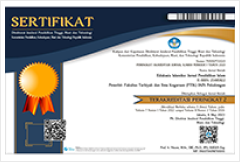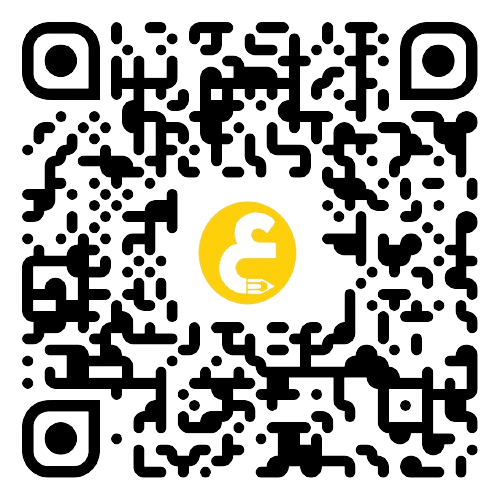Develompment of an E-Module For Educational Evaluation Course With a Problem Based Learning Framework
DOI:
https://doi.org/10.28918/jei.v9i1.7242Keywords:
e-Module Development, Educational Evaluation, Problem-Based Learning, Critical Thinking, Self-Directed LearningAbstract
The integration of technology into education is important in the current digital era. The aim of this research is to develop an E-module for Educational Evaluation Course using the concept of problem-based learning (PBL). This research uses the ADDIE development model (analysis, design, development, implementation, and evaluation). The research participants were students in the fourth semester of the STAI Ki Ageng Pekalongan Islamic Education Management Study Program. Data collection techniques included documentation, observations, questionnaires, and interviews. The data were analyzed using quantitative and qualitative approaches (mixed methods). The results showed that the development and implementation of e-modules for Educational Evaluation courses have yielded favourable outcomes, showcasing high levels of student learning independence, critical thinking ability, involvement in the learning process, and satisfaction with the e-modules. These results suggest that e-modules serve as effective tools for enhancing student learning experiences and fostering engagement within educational settings, ultimately contributing to improved learning outcomes and heightened student satisfaction. However, the scope of research focusing on a specific course and student demographics may limit the broader applicability of the findings to other educational contexts. Moreover, the predominant reliance on quantitative data analysis may overlook the nuanced aspects of student experiences and perceptions, emphasizing the necessity for more comprehensive qualitative exploration in future investigations.
References
Agustina, D. D., & Efendi, A. (2021). E-Module Based Project Learning for Teaching Speaking. Premise : Journal of English Education and Applied Linguistics, 10(2), 267–283. https://fkip.ummetro.ac.id/journal/index.php/english
Allen, M. (2012). An Agile Model for Developing the Best Learning Experiences Leaving ADDIE for SAM. the American Society for Training & Development. www.copyright.com,
Ann Tomlinson, C., & Moon, T. R. (n.d.). Assessment and Student Success in a Differentiated Classroom. www.ascd.org/memberbooks
Branch, R. M. (2009). Instructional design: The ADDIE approach. In Instructional Design: The ADDIE Approach. Springer US. https://doi.org/10.1007/978-0-387-09506-6
Chang-Tik, C. (2022). Introduction: Collaborative Active Learning—Strategies, Assessment and Feedback. In C. Chang-Tik, G. Kidman, & M. Tee (Eds.), Collaborative Active Learning: Practical Activity-Based Approaches to Learning, Assessment and Feedback (pp. 3–32). Springer Nature. https://doi.org/10.1007/978-981-19-4383-6
Chen, H. T. (2015). Practical Program Evaluation: Theory-Driven Evaluation and the Integrated Evaluation Perspective.
Creswell, J. W. (2012). Educational Research: Planning, Conducting, and Evaluating Quantitative and Qualitative Research (4th ed.). Pearson Education, Inc.
de Jong, T., van Joolingen, W., Scott, D., de Haag, R., Lapied, L., & Valent, R. (1994). SMISLE: System for Multimedia Integrated Simulation Learning Environments. In T. de Jong & L. Sarti (Eds.), Design and Production of Multimedia and Simulation-based Learning Material (pp. 133–167). Springer Netherlands. https://doi.org/10.1007/978-94-011-0942-0
Due, L. R. D., Siswanto, & Imran, A. F. (2023). Development of E-Modules Based on Articulate Storyline 3 to Improve Accounting Cycle Learning Outcomes. JPI (Jurnal Pendidikan Indonesia), 12(3), 490–499. https://doi.org/10.23887/jpiundiksha.v12i3.59688
Erlina, M. H., Melati, H. A., & Enawaty, E. (2022). Pengembangan E-Modul Berbasis Multipel Representasi Dengan Bantuan Teknologi Augmented Reality untuk Pembelajaran Materi Bentuk Molekul. Jurnal Pendidikan Sains Indonesia, 10(1), 89–114. https://doi.org/DOI: 10.24815/jpsi.v10i1.22579
Fitarahmawati, & Suhartini. (2021). Empowering Critical Thinking and Problem-Solving Skills During Pandemic Through Contextual Distance-Learning in Biology. Proceedings of the 6th International Seminar on Science Education (ISSE 2020), 39–47.
Flick, U. (2018). The SAGE Handbook of Qualitative Data Collection (U. Flick, Ed.). SAGE Publication,Ltd.
Gunawan, M. A. (2015). Statistik Penelitian Bidang Pendidikan, Psikologi dan Sosial: Dilengkapi Dengan Contoh Secara Manual dan SPSS. Parama Publishing.
Holden, D. J., & Zimmerman, M. A. (2009). Evaluation Planning Here and Now. In D. J. Holden & M. A. Zimmerman (Eds.), A Practical Guide to Program Evaluation Planning (pp. 7–29). SAGE Publications, Inc.
Johan, R. C. (2018). Developing Online Course Material on Information Literacy: A Design-Based Research Approach. In K. A. Persichitte, A. Suparman, & M. Spector (Eds.), Educational Technology to Improve Quality and Access on a Global Scale Papers from the Educational Technology World Conference (ETWC 2016) (pp. 71–90). AECT. https://doi.org/https://doi.org/10.1007/978-3-319-66227-5
Kolb, D. A. (2015). Experiential Learning: Experience as The Source of Learning and Development (Second). Pearson Education, Inc.
Langer, A. M. (2024). Information Technology and Organizational Learning; Managing Behavioral Change in the Digital Age (Fourth edition). CRC Press. https://doi.org/DOI: 10.1201/9781003315896
Laurillard, D., Oliver, M., Wasson, B., & Hoppe, U. (2009). Implementing Technology-Enhanced Learning. In N. Balacheff, S. Ludvigsen, T. de Jong, A. Lazonder, & S. Barnes (Eds.), Technology-Enhanced Learning: Principles and Products (pp. 289–306). Springer Netherlands. https://doi.org/10.1007/978-1-4020-9827-7
Maksum, H., & Purwanto, W. (2022). The Development of Electronic Teaching Module for Implementation of Project-Based Learning during the Pandemic. International Journal of Education in Mathematics, Science and Technology, 10(2), 293–307. https://doi.org/10.46328/ijemst.2247
Marnita, M., Rahma, R., & Fatimah, F. (2021). Impact of E-Learning Media on Students’ Critical Thinking Skills at Physics Education Study Program, Almuslim University. JIPF (Jurnal Ilmu Pendidikan Fisika), 6(2), 131. https://doi.org/10.26737/jipf.v6i2.1908
Munzil, Affriyenni, Y., Mualifah, S., Fardhani, I., Fitriyah, I. J., & Muntholib. (2022). Development of Problem Based Learning Based E-modules in the form of Flipbooks on Environmentally Friendly Technology Materials As an Independent Learning Material for Students Especially Online Learning. Jurnal Pendidikan Sains Indonesia, 10(1), 37–46. https://doi.org/DOI: 10.24815/jpsi.v10i1.21807
OECD. (2016). Innovating education and educating for innovation : the power of digital technologies and skills. OECD Publishing. https://doi.org/http://dx.doi.org/10.1787/9789264265097-en
Osborne, M., Houston, M., & Toman, N. (n.d.). The Pedagogy of Lifelong Learning: Understanding Effective Teaching and Learning in Diverse Contexts.
Phillips, P. P., & Stawarski, C. A. (2008). Data Collection: Planning for and Collecting All Types of Data (P. P. Phillips & Jack. J. Phillips, Eds.; 2nd ed., Vol. 2). John Wiley & Sons, Inc.
Prasetya, R., & Prihandono, D. (2022). Development of E-Modules With Problem-Based Learning (PBL) to Increase Economic Learning Outcomes Article Info. JEE, 11(1), 93–102. http://journal.unnes.ac.id/sju/index.php/jeec
Rahayu, S., Isnaeni, W., & Masturi, M. (2022). Critical Thinking Skills and Digital Literacy of High School Students in Science Learning Using E-Learning with STEM Vision. Journal of Innovative Science Education, 11(3), 347–361. http://journal.unnes.ac.id/sju/index.php/jise
Rahmat, M. R., Arip, A. G., & Nur, S. H. (2020). Implementation of Problem- Based Learning Model Assisted by E-Modules on Students’ Critical Thinking Ability. JPI (Jurnal Pendidikan Indonesia), 9(3), 339. https://doi.org/10.23887/jpi-undiksha.v9i3.22410
Royse, D., Thyer, B. A., & Padgett, D. K. (2010). Program Evaluation: An Introduction. Wadsworth, Cengage Learning.
Ruslan, & Rauddin. (2022). Development of E-Module for Introduction to Educational Technology at Muhammadiyah University of Makassar. IJ-ET: Indonesian Journal of Educational Technology, 1(1), 53–66.
Samani, M., Sunwinarti, S., Putra, B. A. W., Rahmadian, R., & Rohman, J. N. (2019). Learning Strategy to Develop Critical Thinking, Creativity, and Problem-Solving Skills for Vocational School Students. Jurnal Pendidikan Teknologi Dan Kejuruan, 25(1), 36–42. https://doi.org/10.21831/jptk.v25i1.22574
Sintawati, N. P., & Margunayasa, I. G. (2021). Interactive E-Module for Science Learning Content: Validity and Feasibility. International Journal of Elementary Education, 5(1), 19–29. https://ejournal.undiksha.ac.id/index.php/IJEE
Stufflebeam, D. L., & Coryn, C. L. S. (2014). Evaluation Theory, Models, and Applications (Second Edition). Published by Jossey-Bass.
Stufflebeam, D. L., & Shinkfield, A. J. (1985). Systematic Evaluation: A Self·lnstructional Guide to Theory and Practice. In Systematic Evaluation. Springer Netherlands. https://doi.org/10.1007/978-94-009-5656-8
Sukareni, N. L., & Sukmana, A. I. W. I. Y. (2021). The Integration of Problem Based Learning Model on Indonesian Language E-Modules. Indonesian Journal of Education Research and Review, 4, 502–513. https://doi.org/10.23887/ijerr.v4i3
Susanti, A., & Rachmajanti, S. (2023). Developing E-Module in Blended Learning to Promote Students’ Critical Thinking Skills for EFL Student Teachers. Proceeding of the 69th TEFLIN International Conference in Conjunction with the 3rd English Education International Conference (EEIC).
Wahyuningrum, P. M. E., & Hartutik. (2023). Development of E-Modules to Improve Motivation and Learning Outcomes of Catholic Religious Education for Public Elementary School Students. JMKSP (Jurnal Manajemen, Kepemimpinan, Dan Supervisi Pendidikan), 8(2), 1138–1149.
Wijayanto, B., Sumarmi, Utomo, D. H., Handoyo, B., & Aliman, M. (2023). Problem-Based Learning Using E-Module: Do It Effect on Student’s High Order Thinking and Learning Interest In Studying Geography? Journal of Technology and Science Education, 13(3), 613–631. https://doi.org/10.3926/jotse.1965
Yulando, S., Sutopo, S., & Franklin Chi, T. (2019). Electronic Module Design and Development: An Interactive Learning. American Journal of Educational Research, 7(10), 694–698. https://doi.org/10.12691/education-7-10-4
Yuningtyas, L. A., Sariyatun, & Djono. (2023). Problem Based Learning E-Module for Facilitating Sociology Learning in the Digital Era. Jurnal Edutech Undiksha, 11(1), 107–118. https://doi.org/10.23887/jeu.v11i1.58123
Žogla, I. (2019). Principles of Learner Learning-Centred Didactic in the Context of Technology-Enhanced Learning. In L. Daniela (Ed.), Didactics of Smart Pedagogy: Smart Pedagogy for Technology Enhanced Learning (pp. 71–94). Springer International Publishing. https://doi.org/10.1007/978-3-030-01551-0























